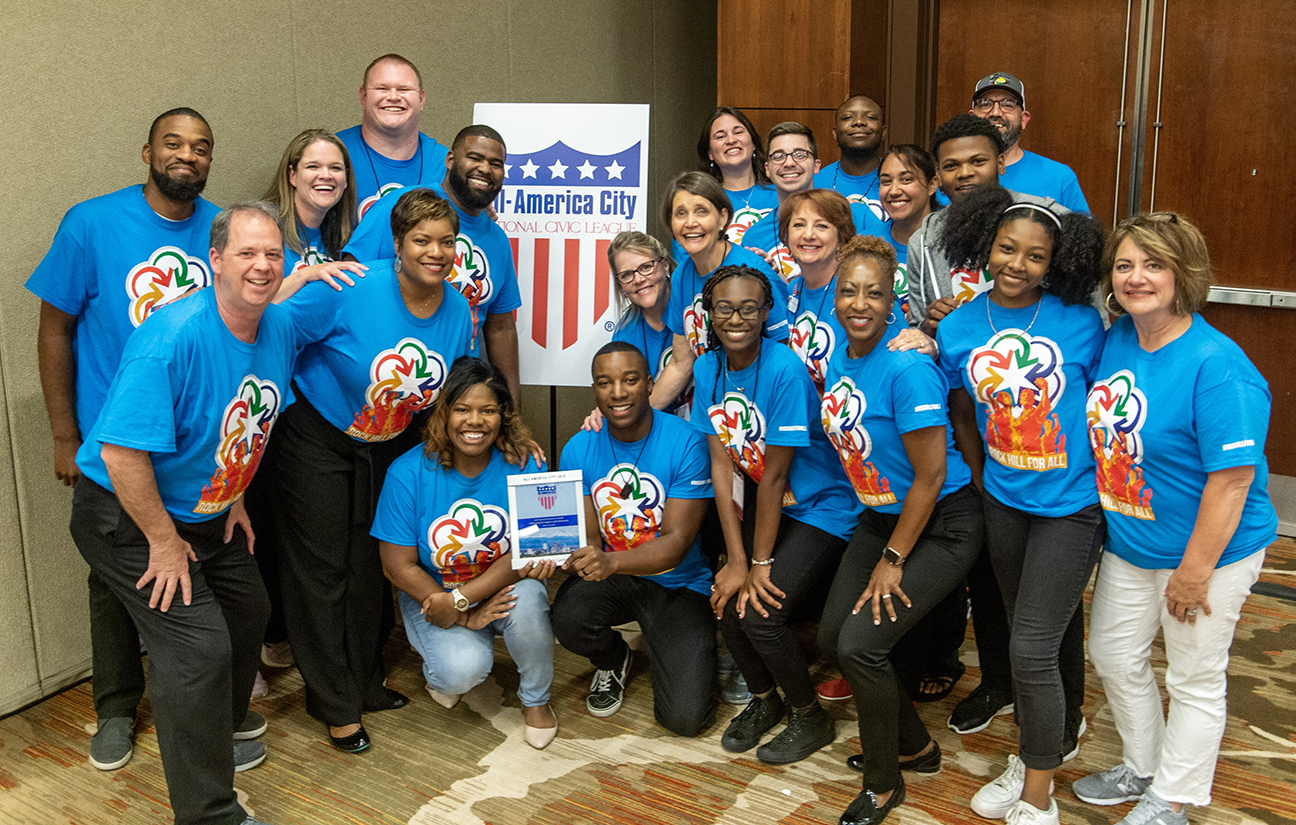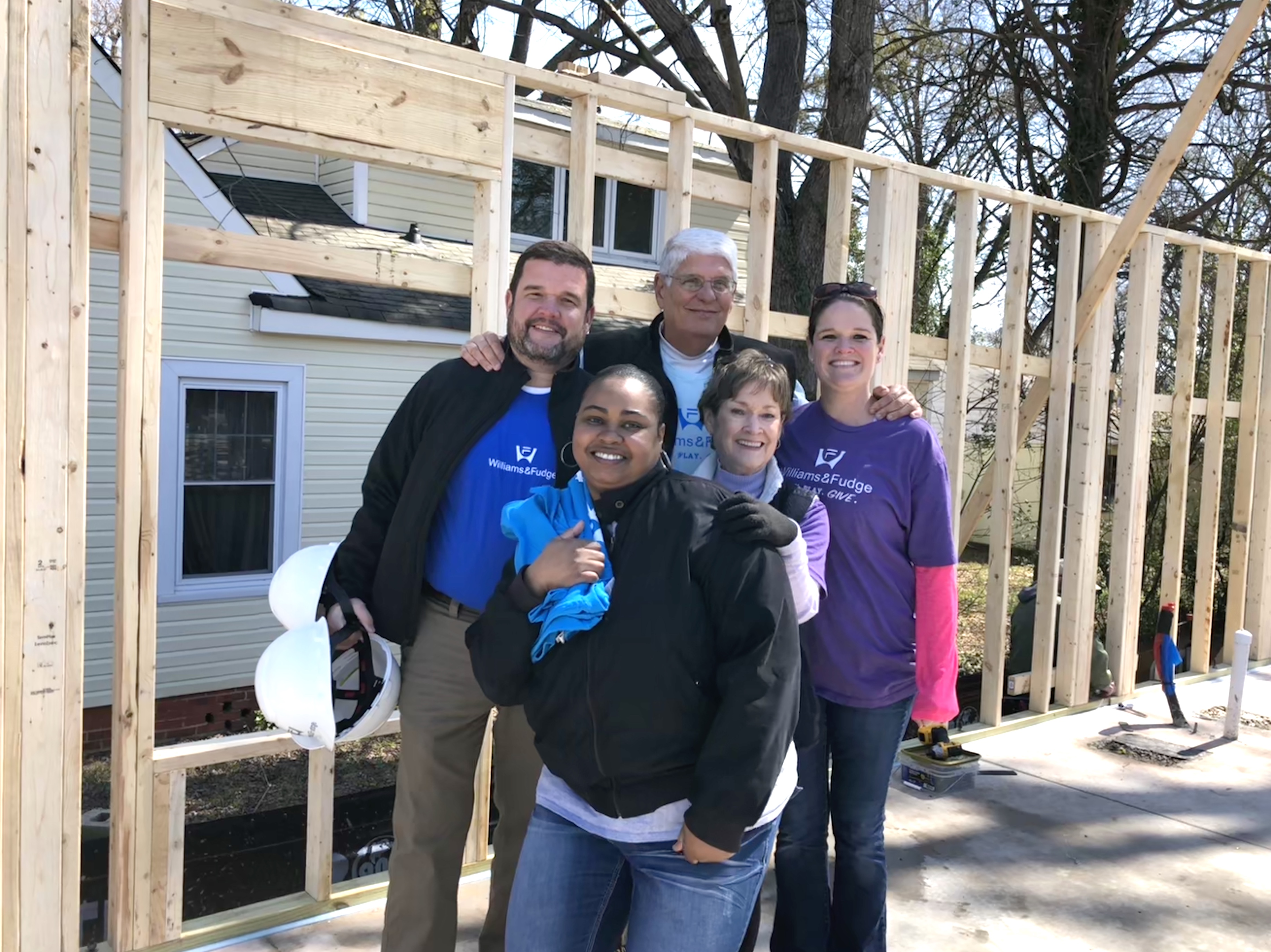For Alice Williams Davis, church, family and community guide her philanthropic journey
On a Sunday evening in December 1980, at Oakland Baptist Church in Rock Hill, SC, a very pregnant Peggy Williams nudged her husband Gary to let him know she was going into labor. Remaining calm, he used a pen and the church bulletin to keep track of the contractions, because the couple wanted to finish the pre-Christmas celebration before leaving.
Fast forward 30 years later: Their daughter, the now-Alice Williams Davis, also went into labor at Oakland Baptist Church – this time, though, while onstage playing handbells. Alice – as dedicated as her mother and as practical as her father – put her phone on a nearby table so she could track her contractions while finishing the concert.
For the Williams family, regular attendance at Oakland Baptist Church is expected. If your mother stays until the end while in labor, you have no excuse.
“The church is very important,” Davis said. “It’s the basis of myself and my family and how I was raised. Even when money was tight I always saw my parents donating money at church. It didn't matter what that paycheck was for that week – they would give to the church.”
If you want to know Alice Williams Davis, you have to start with Oakland Baptist Church, where she and her husband, Kevin Davis, both serve as deacons. If the church is her roots, and her life is the tree, all that defines her are its branches.
Her family is a foundational branch, of course. Her brother David – chair of the deacons at Oakland Baptist and president of their family business Williams & Fudge – lives a few doors down in Rock Hill, on the same street as Alice, Kevin and their three kids: Blake, Delaney and Lilli Jane. Her parents are just a mile away. There’s also her faith, which has helped guide her through every major life decision. And there is the family business where Alice works as the Director of Foundation and Community Support. Their family enjoys working, playing, traveling, and just being together.
But a major branch is charity and philanthropy, interests instilled by her parents and her church at a young age.
Alice’s father, Gary Williams, was a long-time board member of the York County Community Foundation – a regional affiliate of FFTC, where Gary and Peggy hold a donor advised fund – serving for around 14 years until 2012. Since her role at Williams & Fudge involved overseeing philanthropic giving, Gary encouraged his daughter to get involved with YCCF. She went even further, eventually serving as the organization’s board chair.
Her love of philanthropy and community led Alice and her husband Kevin to start a donor advised fund at FFTC and establish a planned gift that will leave a percentage of her charitable estate to FFTC’s Community Impact Fund for Our Region, with her money directed to the York County Community Foundation. The Foundation’s eight endowed Community Impact Funds provide permanent grantmaking assets that focus on broad interest areas – such as health and human services, animal welfare, evolving community issues or geographic regions – with the recognition that needs and organizations may change over time.
“Foundation For The Carolinas is not going anywhere, and therefore the regional foundations are always going to be supported,” she said. “We know we can leave our money in the hands of the decisionmakers in the county at the time – whatever year (in the future) it might be – by giving to the York County Community Foundation.”
It is important to the couple that their local community foundation board will have full discretion to use their gift to address future needs after their lifetimes. Although there are specific causes the couple values, they do not know what needs will arise or what nonprofits will need help in the future.
“As I started learning more about community foundations – and I started to understand more about why it's important 50-100 years from now to continue to give to those places you're passionate about – I realized that I didn't know if (specific nonprofits) would continue to exist,” she said about her family’s long-term giving plans. “But kids are still going to exist. They're still going to be a need. Kids are still going to need an education. That is what is important.”
SMALL TOWN ROOTS
Alice Williams Davis loves her hometown of Rock Hill. Though it has grown over the years – as Alice points out, it did not get its first Chick-fil-A until she left for college – it still retains its small-town charm.
Rock Hill is also a bit of a South Carolina anomaly, in Alice’s eyes. It’s not as “South Carolina” as Columbia or Charleston or Greenville – larger cities further from the influence of the North Carolina border – but, in the philanthropic world, it doesn’t get treated like the Charlotte suburb it is, either. That feeling of “we are out here doing our own thing” contributes to Alice’s love of her community.

Her father started Williams & Fudge in 1986, when Alice was 5. Like a lot of startups, the debt collection service had some lean years in the beginning – Alice remembers several times her father did not take a paycheck to ensure his employees would be paid.
“That was very important to him,” she said, “being loyal to those that that are helping you.”
She credits Rock Hill and its support for the success that the business and her family have achieved. It’s why the Williams and the Davis families are dedicated to giving back to their community and region, today and in the future – to give back to a community that has given so much to them.
“The people are what make this community and why I'm passionate about it,” she said. “They are amazing everywhere you go. My kids give me a hard time because I'm always talking to somebody, but I love that I know someone everywhere I go. If I'm going to go out to dinner one night, I can look forward to running into somebody and having a conversation about what they're working on in the community.”

THE FAMILY BUSINESS
Alice believes that when God shows you the way, you follow. So when a chance to work for her family’s business was offered, the former teacher took it. Although it’s not teaching, her work allows her to influence the company’s philanthropic direction, which often involves supporting education and those with disabilities.
Alice also joined the boards of several organizations, including the York County Community Foundation, the Rock Hill Schools Education Foundation and the York County Disabilities Foundation, all of which she eventually chaired.
Like most things in Alice’s life, she jumped into her board work with enthusiasm, dedication and a desire to make a difference.
“I encouraged her to get involved since she was coordinating our family giving, and I could not think of a better training ground,” said Gary, who recommended his daughter join YCCF after he left the board in 2012. “She is a loving, caring and organized person who sees the possibilities in people and the organizations that help others."
Her passion for the work led her to want to have a louder voice, a drive that she admits can sometimes not work in her favor. “I'm a very opinionated person,” she admitted. “I don't hold back at board meetings.”
“Alice is a strong leader with an innate ability to bring a group together for the betterment of the community,” said Elizabeth Owen, current York County Community Foundation chair.
Alice pushes people to do more than sit in a board room, encouraging them to aim higher than their goals. She’s also not afraid of making the “hard ask” to potential donors – a trait she said she gets from her father. It’s why, while serving on the Rock Hill Schools Education Foundation, she took a fundraiser that normally raised $25,000 and changed the goal to $200,000.
“Alice helps others in so many ways,” her mother, Peggy, said. “From taking her children to visit nursing homes or deliver canned goods to food banks to asking corporate executives for $500,000 for an all-inclusive Miracle Park for all kids, she has blessed so many.”
Most recently, her desire to help led to the creation of the York County COVID-19 Response Fund, which granted nearly $200,000 to local nonprofits aiding those hurt by the pandemic.
When the pandemic hit in March 2020, Alice contacted the local food bank where her husband volunteered. After identifying the increasing need, and with the help of other local business leaders, she reached out to Foundation For The Carolinas about starting a fund just for York County. Her one request was that the grant process be easy, so nonprofits did not have to stop helping others to get the help they needed.
“I just knew it was important for York County to step up and take care of ourselves,” she said.
BUILDING A MIRACLE
Fortunately, Alice’s husband, Kevin, is on the same page in terms of their philanthropic goals. A former teacher himself, when Kevin was in the classroom, his interest was always on the kids that other teachers would give up on.
That’s a passion Alice shares, which led her to help spearhead the creation of Miracle Park in Rock Hill.
It began with a conversation Alice, her brother David and several others initiated to build a baseball field to hold “Miracle League” games. The organization allows children with all abilities to participate in team sports, with specifically trained coaches who assist the players on a modified field. Alice and her colleagues, however, saw the opportunity for something bigger, noting that Rock Hill does not have a park that provides ease of access for all children to play together.
Ever the fund raiser, Alice has helped her team raise millions, with a goal of having the 15-acre park open – and accessible for all children – in 3-4 years, starting with Phase One this summer.
The Miracle Park – much like the boards she serves on and the estate gift her family has planned – are a way to not only give back to her community but provide an example to her children and their children, for generations.
It was a lesson she learned from Peggy and Gary – always support the causes you care about.
“My biggest part of it is because of my children,” she said about what she wants her legacy to be. “As they get older, we'll continue to talk to them about why this is important to us and why particular causes are important to us. The legacy is not only helping the community but being able to help mold my children into being givers.”



